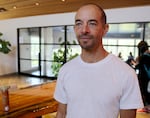
James Carroccio on a visit to Sisters, Oregon, in 2023. He lost his father at 14, and processed that grief in his first psilocybin therapy session.
Courtesy: Jim Carroccio
Oregon’s new psilocybin therapy program went live in January, but it’s taken months to train new facilitators. So people are only now beginning to take hallucinogenic mushrooms under the system.
One of the first was James Carroccio, a retired small business owner. He doesn’t actually live in Oregon. He traveled here from Arizona in his RV. But he used to live in Bend and has kept a close eye on Oregon’s new system in the hope of getting help.
When he was 14, Carroccio found his father in bed, dead from a heart attack. His mother was out of the picture, so suddenly, he was alone.
“I lost everything,” he said. “My world was out of control, and I had to get control of things around me.”
Carroccio developed what he thinks are obsessive-compulsive disorder and post-traumatic stress disorder. By middle age, he spent hours obsessively cleaning the windows, baseboards and floors, even though he could afford to have a housekeeper visit regularly.
“The lines were erratic on the carpet,” he said. “I would get the carpet out and vacuum a very consistent pattern into the carpet.”
His compulsive behavior impacted many aspects of his life, in positive and negative ways; he says he over-regimented the lives of his children. He also thinks his tendency to keep an immaculate job site pleased clients.

Bendable Therapy's service center in Bend. Aug. 3, 2023.
Kristian Foden-Vencil / OPB
Over 30 years, Carroccio estimates he went through a dozen therapists. It was of limited help.
“The therapist always gave me a quick feel-good. But the pattern and the behavior never changed” he said. “With the hope of psilocybin, I was looking for a complete change.”
He found Bendable Therapy in Bend, which helps people access psilocybin at Oregon’s licensed service centers. Co-founder, Amanda Gow, describes Bendable as a non-profit that awards scholarships to people so they can access the therapy. The organization is set up legally so that clients don’t get a bill, instead there’s a suggested donation of $2,300 or more.
“We have a sliding scale donation form. And I say: ‘Here are our parameters. You tell me what you can afford to donate,’” Gow said.
“I think once people go through the program and they see, ‘Oh this is life-changing,’ that maybe they will become monthly donors.”

Bendable Therapy co-founder Amanda Gow says she started the organization as a nonprofit to make sure psilocybin is accessible to as many people as possible.
Kristian Foden-Vencil / OPB
Carroccio didn’t want to say how much he initially donated, but said he’s now on a monthly plan so he can support other people who want to take psilocybin.
At 9 on the morning of Monday, July 17, his wife drove him to the nonprofit’s space in downtown Bend. Facilitator Josh Goldstein took Carroccio into a small room with music playing and a padded cot. Goldstein picked the playlist. They’d already had a conversation about Carroccio’s compulsive behavior and his intentions for the session.
“I asked him: ‘What was happening when this started?’” Goldstein said.
Carroccio said he’d never been asked that question before. It prompted an insight.
“He’s like: ‘Oh my God! 14! That’s when my Dad passed,’” Goldstein said. And I asked: ‘Do you think there’s a connection there?’”

Bendable Therapy psilocybin facilitator Josh Goldstein helped Jim Carroccio decide his intention for his session.
Kristian Foden-Vencil / OPB
Carroccio decided to mourn his father during his psilocybin session, even though the hallucinogenic mushrooms can incite extreme emotions, both positive and negative.
Under Oregon’s new system, people are only allowed to take 50 milligrams of psilocybin at a time. And facilitators aren’t allowed to touch the drugs. So Carroccio was handed three packets of dried mushrooms. They were sealed and marked with a state registration number and the name of the grower.
“They’re very edible,” he said. “Almost like eating a nut.”
He lay down, put on eye shades and practiced some deep breathing techniques. After 20 minutes, he felt the drugs kick in. He said he felt peaceful, as if nothing had physical form anymore.
“I was starting to feel some level of weightlessness, and I was kind of centering into the mattress,” he said. “I wasn’t being bound by the gravity that earth provides.”
Then he started thinking about his mental health and his father.
“My OCD might have been a complication from losing control of my life when I was 14 years old and trying to take control and make everything in order, not chaotic,” he said. “When I exposed myself to that depth of grief that I’d never known, I was immediately rewarded with the most intense love.”
Two days later, as recommended by the people who crafted Oregon’s psilocybin therapy system, Carroccio had another meeting with Goldstein to integrate new insights into his life.
While his experience was positive, the new system is not considered medical. Facilitators are not allowed to diagnose or treat health conditions. They’re only licensed to oversee psilocybin sessions and make sure participants remain safe.
Meanwhile, the state is building a dashboard to illustrate various aspects of the new program, like licensing and compliance. The data won’t contain names.
There are also plans for future studies to see how well it’s working.
While facilitators warn that psilocybin is not a magic bullet for OCD, depression, or any other health problem, Carroccio said it helped immeasurably. He’s decided not to go back to therapy. Instead, he wants to meet with other people who have gone through psilocybin treatments.
“It’ll be much better to relate to someone,” he said. “They’re going to understand it and I think I’m going to understand where they’ve been.”
Carroccio said he’s driving slower now as a result of the psilocybin and letting other cars go in front of him. He’s also talking to people he may not have talked to before.
His wife, Tanya Smith-Carroccio, said he seems more thoughtful, too.
“There seems to be less impulsivity and more controlled and mindful reactions,” she said.
Carroccio thinks he might take psilocybin again, to continue his personal growth. And he wishes it had been available 45 years ago.
Correction: An earlier version of this story misstated the legal status of Bendable Therapy under Oregon’s new psilocybin system. OPB regrets the error.
